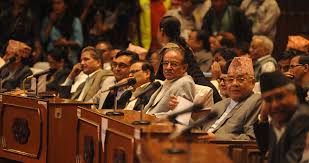Bring on board disgruntled parties before election (Commentary)
 Pritam Bhattarai / Kathmandu: The recent decision of the big three political parties to go for local elections without bringing the disgruntled parties on board is not a good idea at least at this point of time, for it may push the country into confrontation and conflict.
Pritam Bhattarai / Kathmandu: The recent decision of the big three political parties to go for local elections without bringing the disgruntled parties on board is not a good idea at least at this point of time, for it may push the country into confrontation and conflict.
Over a year, the major political parties were divided on whether the constitution should be promulgated despite the displeasure of Madhesh-based political parties. They have been demanding changes to some provisions of the constitution regarding provincial demarcation, representation in the upper house, and the citizenship.
The political parties who brought the constitution through Parliament might have thought that once the national charter came, everything would be resolved gradually, automatically.
However, the situation took a reverse turn. Right after the promulgation of the constitution, the disgruntled groups, including Madhes-centric political parties, refused (now are refusing) to own the constitution, claiming that the statute failed to address their demands.
Subsequently, they took to the streets in protest (first in Tarai districts and then in Kathmandu). The protest reached its peak and got to the point that it resulted in the deaths of over 45 people in the southern plains, in addition to the vandalism, arson, destruction of property worth millions of rupees and closure of industries. Those who shut industries in the protest hit areas are still unsure how their business could be safe and secure and delaying the resumption.
Nepali people also had to suffer inhumane unofficial economic blockade imposed by India, which was said to be creating pressure on top political parties of the country to bring the disgruntled groups on board.
Still, the disgruntled parties have been warning of severe consequences if the local body elections are held without first addressing their demands. It means they are in a mood to launch stern protest against the polls at least in Tarai districts if not nationwide.
The current political problems resulting largely from the failure to increase the acceptability of the constitution are still taking its toll. Since the constitution was promulgated, no substantial progress in terms of implementing the constitution has been made for differences of parties’ priorities. Three governments have been made since then in a bid to ensure acceptability of the constitution, but to no avail.
Democracy becomes meaningful and functions fully if its values are percolated at grassroots level. But local bodies have been deprived of people’s representatives for over past 20 years. Development activities at local level have been severely affected for lack of people’s representatives. The dire need of people’s representatives at local level was felt when local bodies faced tough time while providing relief materials and collecting data of earthquake victims of April 25, 2015.
Despite this reality, the political parties are still sticking to their stands, turning back to the efforts to resolve current political crisis. On the other hand, Madhesi people still feel that they are betrayed by Kathmandu. Some extremist groups are active in the protest hit areas, misguiding the locals for their personal interests. Since Madhesprotest, the political party leadershave failed to reach out to the people in villages to make them aware of what the constitution has provided them, so that their misunderstanding on the national charter could be wiped out.
Likewise, the Local Level Restructuring Commission is facing difficulties to discharge its duty related to determining and carving out the numbers of local bodies due to protests by local people.
So in these circumstances, holding local body elections without taking disgruntled Madhes-based political parties along means to invite another protest. Here again all political parties and the disgruntled groups must sit together to solve the problems and go together for the elections.
Putting on hold the process to get along the disgruntled parties does not ensure that the current political problems would be resolved later. Rather it will exacerbate the problems. Now, the time has come for the parties, especially the big ones to ponder how they could be accommodative to negotiate the tough time. RSS
